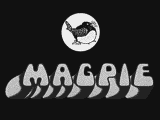Magpie (TV series)
| Magpie | |
|---|---|
 The Magpie logo. | |
| Genre |
Children's Entertainment |
| Created by |
Lewis Rudd Sue Turner |
| Presented by |
Tony Bastable Tommy Boyd Pete Brady Jenny Hanley Douglas Rae Mick Robertson Susan Stranks |
| Theme music composer | Eddie Hardin, Ray Fenwick & Spencer Davis |
| Country of origin | United Kingdom |
| Original language(s) | English |
| Production | |
| Executive producer(s) |
Lewis Rudd Sue Turner |
| Running time | 25 minutes |
| Production company(s) | Thames Television |
| Distributor | Fremantle Media |
| Release | |
| Original network | ITV |
| Picture format | 4:3 |
| Audio format | Monaural sound |
| Original release | 30 July 1968 – 6 June 1980 |
Magpie was a British children's television programme shown on ITV from 30 July 1968 to 6 June 1980. It was a magazine format show intended to compete with the BBC's Blue Peter, but attempted to be more "hip", focusing more on popular culture. The show's creators Lewis Rudd and Sue Turner named the programme Magpie as a reference to the magpie's habit of collecting small items, and because of "mag" being evocative of "magazine", and "pie" being evocative of a collection of ingredients.
Broadcast history
The programme, made by Thames Television, was first transmitted on 30 July 1968 which was Thames Television's first day of broadcasting, and was shown weekly until 1969. From that point, until it ended on 6 June 1980, it went out twice a week with approximately 1,000 episodes being made, each 25 minutes in duration. It was not fully networked to all other ITV companies until the autumn of 1969.
The first presenters were the former BBC Radio 1 disc jockey Pete Brady, Susan Stranks and Tony Bastable. Brady left the show in 1969 to be replaced by Douglas Rae, and Bastable left in 1972 when he was replaced by Mick Robertson. Jenny Hanley replaced Susan Stranks in 1974. This lineup remained until 1977, when Tommy Boyd replaced Rae.
Like Blue Peter, Magpie featured appeals for various causes and charities. Notably, however, it asked for cash donations rather than stamps or secondhand goods, familiar on Blue Peter. The cash totaliser was a long strip of paper which ran out of the studio and along the adjacent corridor walls. Unlike the BBC programme, Magpie was unscripted and the presenters were free to improvise the presentation of the show.[1]
The show's mascot was a magpie called Murgatroyd.
Theme song
The theme tune was played by the Spencer Davis Group under the alias of The Murgatroyd Band, and composed by Eddie Hardin (lead voc., keyb.), Ray Fenwick (harm. voc., guit.) and Spencer Davis (harm. voc.guit.). The main lyric was cribbed from an old children's nursery rhyme:
- One for sorrow
- Two for joy
- Three for a girl
- Four for a boy
- Five for silver
- Six for gold
- Seven for a story never to be told
- Eight for Heaven
- Nine for Hell
- Ten for the Devil himself.
or, alternatively,
- Eight for a wish
- Nine for a kiss, and
- Ten for a big surprise!
The first seven lines of this song (from "One for sorrow" to "Seven for a secret never to be told") have been used in the last verse of the song "Magpie", by Patrick Wolf.
The rhyme refers to an old English superstition concerning the portent of the number of magpies seen together in a flock. The TV programme version altered the final lines to:
- Eight's a wish and
- Nine a kiss
- Ten is a bird you must not miss. (a tongue-in-cheek admonition not to miss future editions of Magpie).
Steam engine
In 1973, Magpie adopted a steam engine, "Black 5" 44806 and renamed her "Magpie" (Blue Peter already had a locomotive with the same name as the show). After an eventful history, it is still being used today on the North Yorkshire Moors Railway, although now without the name.
Magpie also adopted a boat originally called "Mankadu", and renamed "Thames Magpie". It sank.
External links
- British Film Institute Screen Online
- Television Heaven page
- Magpie at the Internet Movie Database.
- Magpie at TV.com .
References
- ↑ Magpie [Network DVD] ASIN: B00272F3TW Release date: 29 Jun 2009